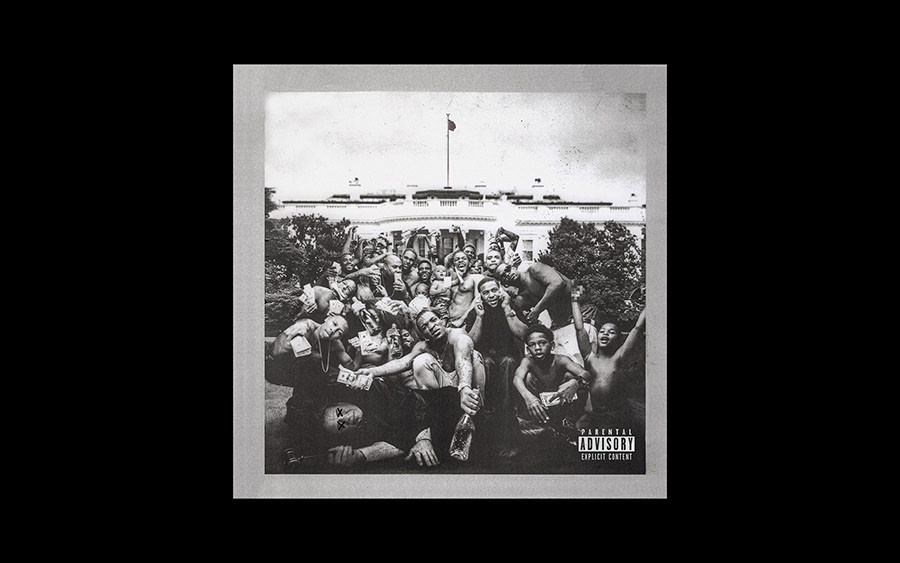Kendrick Lamar Moves Hip-Hop Forward by Returning to its Roots
“To Pimp a Butterfly” will be remembered as the defining album of our era.
Since release, Kendrick Lamar’s To Pimp A Butterfly has been the most critically and quickly acclaimed album of the 21st century, currently holding the #2 spot on Metacritic’s list of the best albums registered on the site.
It’s pretty evident as to why — The album has a radically innovative sound, bringing hip-hop back to its traditional roots of soul, funk and jazz (and without the use of sampling).
However, the album’s legacy goes beyond the sound, as Lamar delivers a powerful social and political statement. In fact, some of his statements have proved polarizing — featuring lines such as, “I’m black as the heart of an Aryan.” Many who’ve found themselves unaccepting of Lamar’s message are misunderstanding him, as he often delivers his statements in a satirical manner. His themes are also universal, as he encourages listeners to find satisfaction and peace in life by respecting others.
In a manner that blends naturally with the music, Lamar reveals in the album’s epic conclusion that his work is a call to action for those who blindly accept a situation they’re unsatisfied with — thus allowing others to “pimp” and corrupt them for their own advantage. He directs this message most clearly towards the current situation for people of color in the USA.
The album opens with “Wesley’s Theory”, a Funkadelic-inspired psychedelic trip that invokes Alice in Wonderland. With a thundering bass played by classic punk musician Thundercat, vocals from the god of funk, George Clinton, an appearance from Dr. Dre, and bitingly satirical lyrics from Lamar, it’s difficult not to enjoy this track immensely.
“King Kunta” is the revival of funk-hop that hip-hop enthusiasts have longed for. It’s dominated by a beat that’s reminiscent to classic African music that serves as the backdrop for a suspenseful instrumental and an ensemble of backing vocalists who support Lamar’s (ferocious, yet incredibly catchy) vocals. Despite its subject matter, it’s unsurprising that this song became a hit, as it is the album’s most accessible track.
In “Institutionalized,” the warmth of “King Kunta” is replaced with a cold-hearted and blunt aesthetic. A soul-inspired instrumental scores Lamar’s calm voice. He questions how hip-hop musicians are able to find success by glorifying gang violence, before concluding that their success is a result of a long legacy of institutionalized racism. He also questions the effects his own fame has had on him, as he expresses a suspicion that many flock to him blindly by disregarding the statements behind his music. (This was demonstrated in his previous album, as many didn’t catch on to its satire.)
“These Walls” is an R&B anthem. It emanates a grand sense of awe and satisfaction while a combination of slow, melodic singing and rapping accompanies a smooth, funky instrumental.
Lamar depicts himself undergoing a mental breakdown in “U”, as his insecurities begin to overwhelm. He raps with a broken voice over a disjointed, trippy jazzy instrumental. It goes without saying that this is a bold statement, as most are used to hip-hop musicians glorifying themselves.
“For Sale?” criticizes the “bling” culture in hip-hop music, and the general corruption of celebrity culture while featuring a prominent jazz instrumental. This track stands out, due to it’s captivating instrumental that works naturally in conjunction with Lamar’s vocals. In one of the most compelling parts of the album, he tells the story of a character named Lucy, (Representative of Lucifer).
In “Momma”, Kendrick recollects a trip to South Africa, referring to the country as his true birthplace. He also struggles with his fame in this track, as he depicts a conversation with an African child who states that he has trouble relating to him due to his constant glorification.
“Hood Politics” juts between being humorous/satirical and serious. Because of this duality, it’s scored by a smooth instrumental that’s simultaneously downbeat and energetic. Kendrick also turns on critics for praising music that he finds subpar, and specifically references underground rapper Killer Mike as an example. Because critics care more for pop musicians than musicians who want to innovate, the latter ends up far less popular than they should be.
“How Much a Dollar Costs” returns to South Africa, as Lamar recalls a moment when he refused to help a homeless man, solely because he presumed him to be a crack addict. The man then asks him if he’s read Exodus 14 (Which states that truly, all we need is humility), which causes him to regret his selfishness and prejudice. Ron Isley of the Isley Brothers plays jazz piano in this song, creating a somber atmosphere.
In “Complexion (A Zulu Love)”, Lamar encourages listeners to disregard any negative connotations attached to heritages. Throughout this entire track, he references the Universal Zulu Nation, a hip-hop movement that existed in the 70s and 80s, which existed to encourage people of color involved in gangs to break away, and seek their own destiny without allowing nationality to get in the way. The track sounds like a modernized version of the sound created with mid-90s east-coast hip-hop, which is likely deliberate, as much of the work embodied this philosophy.
“The Blacker The Berry” is a catharsis. On this track, Lamar becomes a beast — he ferociously expels all of his anger and frustration and makes a call to action, demanding that listeners quit striving to further divide races through means such as BET and glorification of gang culture. Arguably, this is the best hip-hop song of the 21st century yet — It possesses a sense of fierce power coupled with emotional purity.
The grammy-winning “I” contrasts completely with “The Blacker The Berry”, as it features an Isley Brothers sample coupled with vocals supported by a backing singer that promote self-love. It’s been speculated that “I” represents Martin Luther King Jr, whereas “The Blacker The Berry” is a representation of Malcolm X. Due to the song’s overwhelmingly positive and energetic tone, Lamar has stated that this is the best song he’s written. As a result, it goes without saying that this track stands out.
The album concludes with “Mortal Man”, a 12-minute long epic existential crisis. In this track, Lamar expresses concerns about his potentially bleak future while questioning if he truly matters at all to others. He goes on to ask fans to question themselves if they truly respect him. The tonality featured is somber and angry, yet somewhat tranquil and at peace.
Altogether, To Pimp a Butterfly is undoubtedly the best album and most innovative released in years. While it has its flaws, such as occasionally boring hooks, they do little to harm the incredible experience this album offers. It’ll go down in history as a classic, likely as the defining hip-hop album of our era — if not, then it’ll definitely be remembered with other hip-hop classics, such as Nas’ Illmatic and Public Enemy’s It Takes a Nation of Millions to Hold Us Back.










